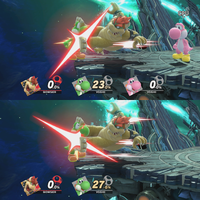1v1 multiplier

The 1v1 multiplier, officially known as 1-on-1 damage (referred to as White-Knuckle 1-on-1 in the initial design document[1]), is a mechanic in Super Smash Bros. Ultimate. First revealed by Masahiro Sakurai at E3 2018, its purpose is to speed up matches between two players, compensating for the fewer opportunities to land hits compared to free-for-alls.[2] Increasing the damage dealt by attacks naturally causes players to be KOed sooner by subsequent attacks.
When a match is started with only two players and items off, characters take 1.2× damage from all sources. It does not activate if a match is started with more than 2 players and items off, even after two players are left standing. Unlike most other damage multipliers, the 1v1 multiplier modifies damage taken, rather than damage given, and is ignored in many calculations. As a result, it has some unintuitive interactions:
- It does not affect the amount of damage needed to KO an opponent. If a move will KO when it hits an opponent at 120%, it will do so whether the 1v1 multiplier is on or off. The same goes for knockback-based armor, such as Yoshi's midair jump.
- The sole exception to this is the knockback dealt by damage terrain, such as the Danger Zones on The Great Cave Offensive, and the lava on Super Mario Maker, which is affected by the multiplier.
- It does mean that the opponent will be at higher damage before the last hit of a multi-hit move connects, and thus the move will effectively KO earlier.
- Similarly, while the damage necessary to break damage-based armor is unaffected, the higher damage dealt by previous hits may alter whether the next hit will succeed.
- King K. Rool's Belly Super Armor is an exception, as the mechanic must first apply the final post-multiplier damage in order to split the applied damage between K. Rool and his belly, and only then can it decide whether to break. As a result, it breaks slightly earlier, especially when considering freshness.[3][4]
- There are cases where the 1v1 multiplier can benefit certain attacks as well. Rebel's Guard and Revenge both get higher boosts thanks to them calculating damage before applying their respective effects. As a result of these examples, Joker's Rebellion Gauge will fill faster, and Incineroar can get higher damage multipliers.
- It does not affect the length of hitstun, hitlag or shieldstun, or knockback-dependent status effects, though a separate mechanic results in hitlag being higher in 1v1 matches
- It does not cause projectiles to break through reflection earlier.
- It does not affect the damage received by counterattacks or absorption moves.
- It amplifies recoil damage and hoop damage, but it does not alter healing.
Shields and stage elements are unaffected by the multiplier, though most other player-created objects are (such as Pikmin).
In Training Mode, it actively toggles on and off depending on how many CPU opponents are selected to appear (taking effect during any period there is only one CPU), and spawning items does not affect its presence. This also makes training the only mode where damage from non-character items can be altered by the 1v1 multiplier.